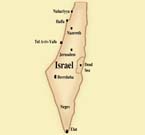Israel holds municipal elections; Jerusalem elects new mayor
 Jerusalem - Israelis were going to the polls Tuesday to elect new city councils and mayors for their hometowns.
Jerusalem - Israelis were going to the polls Tuesday to elect new city councils and mayors for their hometowns.
Some 4.7 million Israelis are eligible to vote in the nationwide municipal elections.
Polls opened from 7 am (0500 GMT) in 159 villages, towns and cities, including Jerusalem, where voters will chose a replacement for current Mayor Uri Lupolianski, an ultra-Orthodox Jew of the United Torah Judaism faction.
Lupolianski has been accused by critics of imposing his religious outlook on municipal affairs and promoting Jewish interests over Arab ones.
Lupolianski has in the past also clashed with the city's homosexual community for trying to stop or change the venue of its annual Gay Parade, which is controversial in the religious city.
Jerusalem has some 730,000 inhabitants, including about 250,000 Palestinians who live in the eastern part of the city, which Israel captured from Jordan in the 1967 Middle East war and annexed shortly afterwards.
East Jerusalem's Palestinian residents are eligible to vote in the municipal elections, but many traditionally boycott them because they do not recognize the annexation.
With West Jerusalem's population becoming increasingly religious, the ultra-Orthodox have been dominating the city council since 2003.
The main contenders in Jerusalem are independent entrepreneur Nir Barkat, a secular Jew, and Meir Porush, a 54-year-old ultra-Orthodox rabbi, who, like Lupolianski, is a member of United Torah Judaism.
Barkat, 49, narrowly lost the 2003 mayoral race and has served as the head of the "opposition" on the city council.
A third, controversial candidate is Russian-born billionaire Arkady Gaydamak, 56, who is suspected of money-laundering and involvement in a major arms deal scandal, and accused by critics of trying to buy his popularity by lavishly handing out gifts and donations. He has defended himself by saying he is a philanthropist.
The candidates in Jerusalem, Tel Aviv and elsewhere must win at least 40 per cent of the vote to avoid a second round within two weeks.
A mayor's term in Israel is five years. Voters cast two ballots: one for a mayoral candidate and one for a list.
Polls are due to close by 10 pm (2000 GMT). First real results are expected around midnight. (dpa)